
The Ramayana, also known as Valmiki Ramayana, as traditionally attributed to Valmiki, is a smriti text from ancient India, one of the two important epics of Hinduism known as the Itihasas, the other being the Mahabharata. The epic narrates the life of Rama, the seventh avatar of the Hindu deity Vishnu, who is a prince of Ayodhya in the kingdom of Kosala. The epic follows his fourteen-year exile to the forest urged by his father King Dasharatha, on the request of Rama's stepmother Kaikeyi; his travels across forests in the Indian subcontinent with his wife Sita and brother Lakshmana; the kidnapping of Sita by Ravana, the king of Lanka, that resulted in war; and Rama's eventual return to Ayodhya along with Sita to be crowned king amidst jubilation and celebration.

Ravana is a mythological demon-king of the island of Lanka and the chief antagonist in the Hindu epic Ramayana. In the Ramayana, Ravana is described as the eldest son of sage Vishrava and Kaikasi. He abducted Rama's wife, Sita, and took her to his kingdom of Lanka, where he held her in the Ashoka Vatika. Rama, with the support of vanara King Sugriva and his army of vanaras, launched a rescue operation for Sita against Ravana in Lanka. Ravana was subsequently slain, and Rama rescued his beloved wife Sita.
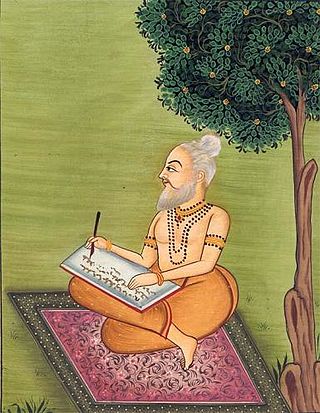
Valmiki was a legendary poet who is celebrated as the traditional author of the epic Ramayana, based on the attribution in the text itself. He is revered as Ādi Kavi, the first poet, author of Ramayana, the first epic poem.

Lakshmana, also known as Laxmana, Saumitra and Ramanuja, is a Hindu god and the younger brother of Rama in the Hindu epic Ramayana. He is considered as an incarnation of Shesha, the lord of serpents. Lakshmana was married to Urmila, and is known for his loyalty and dedication towards Rama.

Kaikeyi is a princess of Kekeya and the queen of Kosala in the Hindu epic Ramayana. Kaikeyi is the third queen and favourite consort of King Dasharatha, who ruled Kosala from its capital, Ayodhya. She is the mother of Bharata.
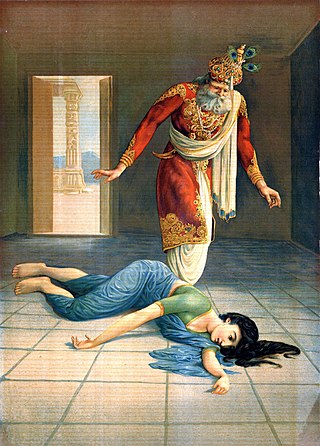
Dasharatha was the king of Kosala, with its capital at Ayodhya, in the Hindu epic Ramayana. Dasharatha married Kausalya, Sumitra and Kaikeyi. He was the father of Rama, the protagonist of the epic, Bharata, Lakshmana, and Shatrughna. Dasharatha also finds mention in the Vishnu Purana.

Shambuka is a character in some editions of the Ramayana. Some say that the character and his story are an interpolation which is not found in the original Valmiki Ramayana but in a later addition called Uttara Kanda.

Sita, also known as Siya, Janaki and Maithili, is a Hindu goddess and the female protagonist of the Hindu epic Ramayana. Sita is the consort of Rama, the avatar of god Vishnu, and is regarded as an avatar of goddess Lakshmi. She is the chief goddess of the Ramanandi Sampradaya and is the goddess of beauty and devotion. Sita's birthday is celebrated every year on the occasion of Sita Navami.

Sampati is a demigod in Hinduism. He is the elder son of Aruna. He is the elder brother of Jatayu. He has the form of either a vulture or an eagle. Sampati loses his wings when he is a child. According to the Brahma Purana, Sampati has a swift and well-known son Babhru.
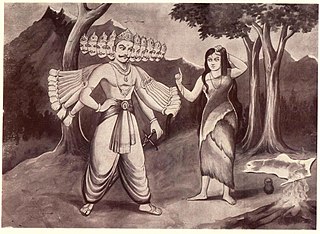
Vedavati is the previous birth of the goddess Sita in Hindu mythology. She is the Goddess of the Vedas, who embodies and imparts all knowledge and wisdom. An avatar of the goddess of prosperity, Lakshmi.

Bharata is the younger brother of Rama in Hindu epic Ramayana, and the regent of Ayodhya during Rama's exile. Bharata is considered as an incarnation of the Panchajanya of god Vishnu, and was married to Mandavi.

Shurpanakha, is a rakshasi (demoness) in Hindu epic. Her legends are mainly narrated in the epic Ramayana and its other versions. She was the sister of Lanka's king, Ravana, and the daughter of the sage Vishrava and the rakshasi Kaikeshi. Shurpanakha's role in the original epic is small, yet significant.
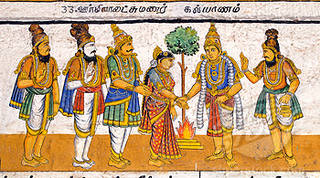
Urmila, is a Hindu goddess and the princess of Videha in the Hindu epic Ramayana. She is considered to be an avatāra of Nagalakshmi, the serpent goddess. Urmila was married to Lakshmana and is known for her dedication towards her husband, for her courage and sacrifice.

Shrutakirti is a princess of Videha, in the Hindu epic Ramayana. She is the wife of Shatrughna and is considered an incarnation of the disc of goddess Lakshmi. Shrutakirti is known for her foresight and dedication.
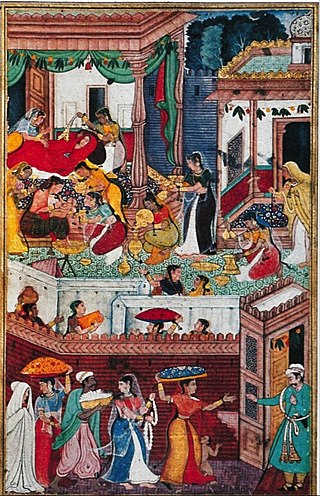
Kausalya is a queen of Kosala in the Hindu epic Ramayana. She is the first queen consort of Dasharatha, who ruled Kosala from its capital Ayodhya. She is the mother of Rama, the male protagonist of the epic. She is a secondary character in the Ramayana, so only aspects of her life are described in detail.

Bibek Debroy is an Indian economist, serving as the chairman of the Economic Advisory Council to the Prime Minister of India. He is also the Chairman of the Finance Ministry's 'Expert Committee for Infrastructure Classification and Financing Framework for Amrit Kaal'. Debroy has made significant contributions to game theory, economic theory, income and social inequalities, poverty, law reforms, railway reforms and Indology among others. Bibek Debroy's recent co-authored magnum opus, Inked in India, stands distinguished as the premier comprehensive documentation, capturing the entirety of recognized fountain pen, nib, and ink manufacturers in India.

Malyavan is a character in Hindu mythology, appearing in the epic Ramayana. A rakshasa, he is the son of Sukesha, and the brother of Mālī and Sumālī. He is described to be a major counsellor to the King of Lanka, Ravana, along with also being the latter's maternal grandfather.
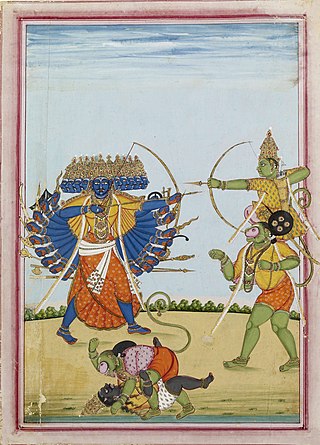
Depending on the methods of counting, as many as three hundred versions of the Indian Hindu epic poem, the Ramayana, are known to exist. The oldest version is generally recognized to be the Sanskrit version attributed to the sage Narada, the Mula Ramayana. Narada passed on the knowledge to Valmiki, who authored Valmiki Ramayana, the present oldest available version of Ramayana.

Rama is a major deity in Hinduism. He is worshipped as the seventh and one of the most popular avatars of Vishnu. In Rama-centric Hindu traditions, he is considered the Supreme Being. Also considered as the ideal man, Rama is the male protagonist of the Hindu epic Ramayana. His birth is celebrated every year on Rama Navami, which falls on the ninth day of the bright half of the lunar cycle of Chaitra (March–April), the first month in the Hindu calendar.
Ravanayan is a ten-part comic series based on the Hindu epic Ramayana released by Holy Cow Entertainment in July 2011, told from the perspective of Ravana. Its creators are Mumbai-based artist Vivek Goel and Mumbai-based writer Vijayendra "Vimoh" Mohanty.


















